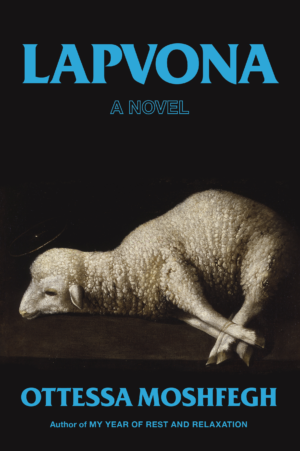Lapvona
by Ottessa Moshfegh
reviewed by Brenna McPeek
Ottessa Moshfegh’s newest novel, Lapvona, differs from the author’s usual intimate tales of wry, rough protagonists. Lapvona is beautifully constructed chaos, sure to evoke awe, discomfort, and lingering puzzlement in its readers. It is Moshfegh’s most daring and grandest novel yet, but in its grandiosity it also lacks the gravity that made her past novels so moving.
Lapvona tells the story of Marek, a “misshapen” social outcast in the small feudal town of Lapvona, where he lives with his brutish shepherd father. “Nobody cared that Marek had come and gone,” Moshfegh writes. “He was like a stray dog that wandered in and out of the village from time to time, and everyone knew he was a bastard.” Marek longs for his mother, a mute woman who, he’s been told, died in childbirth. “She had given her life for his own,” we learn, “like any good mother would do.” In her absence, Marek looks for a surrogate “mother” in anyone and everyone—from the old, witchy woman who nursed him when he was a baby, to the pregnant sheep he and his father tend to. He goes so far in his search for maternal connection as to nurse from the sheep: “He pushed the babes away and put his mouth to the sheep’s teat and sucked until he felt sick. He felt this was his right as a child of God.” Marek is zealous in his faith, a true masochist. “He lived for hardship,” the novel’s omniscient narrator tells us. “It gave him cause to prove himself superior to his mortal suffering.” This desperation for love and divine pain drives Marek to commit a rash, violent act, placing him in the path of Villiam, the silly, narcissistic leader of Lapvona, and the absurd cast of characters in his court. From there, the novel devolves into savage, Old Testament pandemonium: a devastating drought, murder, and—the novel’s choice brutality—the destructive power of Godly fear.
Lapvona is not for the faint of heart or stomach. Even by Moshfegh’s standards, it’s putrid and disturbing. Certain scenes seem designed to test the limits of Moshfegh’s reputation. Just how much can such a talented writer get away with? It’s an excessive, rancid feast of deplorable characters humiliating one another for sport. At times, it feels as if the author is toying with her reader just as she toys with Lapvona’s God-fearing subjects.
The novel and its characters are blatantly theatrical. It’s a Shakespearian play stocked entirely with fools. Moshfegh has always crafted characters to smirk at (her past narrators have included a retching, alcoholic pirate and an heiress intent on pharmaceutically numbing herself for a calendar year), but they’ve always possessed glints of humanity for Moshfegh to excavate. Lapvona, on the other hand, feels strangely void of that humanity. Moshfegh acts less like an excavator here and more like a God exercising power over her characters.
Lapvona plays with such ideas of worship and subjugation. The characters both adore and fear various figures of creation (God, mothers, the natural world) and this awe dictates the events of the novel. “Perhaps it is most miraculous,” the narrator muses, “when God exacts justice even when no human lifts a finger.” Moshfegh is a vengeful creator, and a masterful one as well. Lapvona is expertly executed, with layered, satirical interrogations of motherhood, environmental ruin, organized religion, and more. However, there’s also a distance in Moshfegh’s writing, which squeezes the novel dry of character nuance. Lapvona’s fools are missing the moral complexities that make Moshfegh’s earlier characters so unique. As such, the novel often comes across as a performance rather than a story to invest in. This can prove frustrating, but at the same time, it begs the question: When the performance is so masterful, does there need to be more to it?
“He had a growing paranoia that God was punishing him,” Moshfegh writes of Marek. “He went over his life story again and again, but he reached no enlightening conclusion about its moral.” This rings true of Lapvona as a whole. It’s bizarre, striking, and disarmingly disgusting. It’s a force of destruction as odd and horrifying as the drought that plagues the land in the novel’s second act. Still, it leaves the reader mystified. We are in awe of Lapvona’s creator, yet, at the novel’s end, we’re left wondering how exactly we are supposed to feel about it.
Published on September 15, 2022

